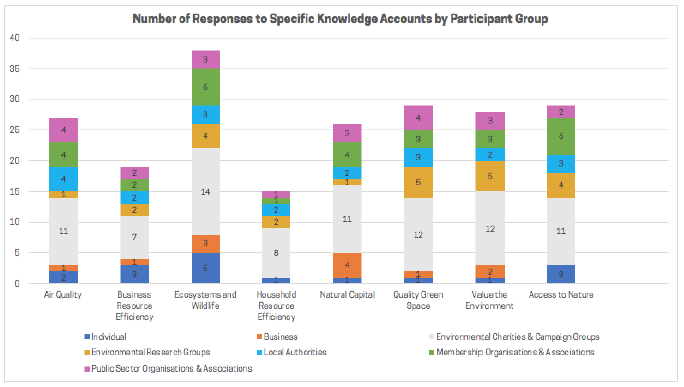Developing an environment strategy for Scotland: analysis of responses to online discussion
Independent analysis of responses to our June to August 2018 online discussion that sought views to help inform the development of an Environment Strategy for Scotland.
Knowledge Accounts
Introduction
4.1 This chapter presents analysis of responses to the eight draft Knowledge Accounts put forward by the Scottish Government. It describes the discussion question and number of responses with a breakdown of responses by individuals and type of organisation. The nature of general comments across the Knowledge Accounts is also summarised.
4.2 Detailed summaries of the responses to each specific Knowledge Account, along with any suggested amendments to the draft wording, are shown in Appendix 1. Quotes that typify responses are provided in Appendix 4.
4.3 Some respondents described additional content they would like to see incorporated in the Knowledge Accounts on a point by point basis; with particular references to evidence that they thought would add value. Acknowledging the succinct nature of this report, the detailed responses are available for review and consideration by the Scottish Government.
Discussion question
4.4 The discussion document included a link to eight Knowledge Accounts[7]. These are summary documents that were developed by the Scottish Government before the discussion paper was drafted.
4.5 Each draft Knowledge Account focuses on a different environmental theme, setting out baseline evidence that will help to inform the development of the Environment Strategy. The Knowledge Accounts set out the current situation, factors which have influenced this position, Scotland’s ambitions in relation to this aspect of the environment and the likely future drivers of change. In addition, the Knowledge Accounts identify key gaps in the evidence base which will need to be addressed.
4.6 Discussion question three asked: what are your views on the draft Knowledge Accounts which will be used to help identify priorities for action in the coming years? What additional sources of key evidence can you add?
4.7 The eight Knowledge Accounts relate to:
- Air Quality
- Business Resource Efficiency
- Ecosystems and Wildlife
- Household Resource Efficiency
- Natural Capital
- Quality Green Space
- Value the Environment
- Access to Nature
4.8 Almost all (93) participants provided a response to this question. Many offered a general comment across the Knowledge Accounts reflecting on the value of a central reference point for key environmental issues. Approximately one third of respondents commented on specific Knowledge Accounts, typically sharing their expertise on particular topics. Some respondents combined these approaches, offering general comments and detailed feedback on particular Knowledge Accounts.
4.9 The chart below shows the number of responses to each specific Knowledge Account by participant type. It shows some variation in frequency of responses, depending on the issue – the level of interest broadly aligns with the responses to specific outcomes as described in chapter 3. For example, the Ecosystems and Wildlife Knowledge Account garnered more comments from environmental charities and campaign group organisations than any other Knowledge Account; local authorities had a slightly higher response rate to the Air Quality Knowledge Account than any other Knowledge Account.

General comments across the Knowledge Accounts
4.10 Participants generally welcomed the Knowledge Accounts, with several respondents highlighting the value of the documents as a central reference point.
4.11 One person suggested the title ‘Knowledge Account’ was unhelpful and urged for the Knowledge Accounts to be described as ‘position statements’ instead. Another described a sense of disappointment that the Knowledge Accounts present existing information and do not contain new evidence.
4.12 As with the comments on outcomes, there were suggestions that aspects of the Knowledge Account are interconnected and/or overlap. For example, there were calls for the following categories to be merged, or for the differences between these Knowledge Accounts to be made more explicit.
- Value the Environment / Natural Capital / Access to Nature.
- Natural Capital / Ecosystems and Wildlife / Quality Green Space.
4.13 Several respondents took the opportunity to describe their organisation’s contribution to the ambition described in ‘where do we want to be?’, or shared thoughts on the ways to achieve key changes. For example, the Heritage Lottery Fund described their work in relation to the Knowledge Accounts on Quality Greenspace and Natural Capital. Historic Environment Scotland highlighted their activity in relation to Air Quality, Business Resource Efficiency and Household Resource Efficiency.
4.14 It was noted that across and within responses the Scottish Government was signposted to a range of reports, data sets, projects and programmes that respondents felt could make a valuable contribution to the evidence base.
Contact
Email: Susie.Turpie@gov.scot
There is a problem
Thanks for your feedback